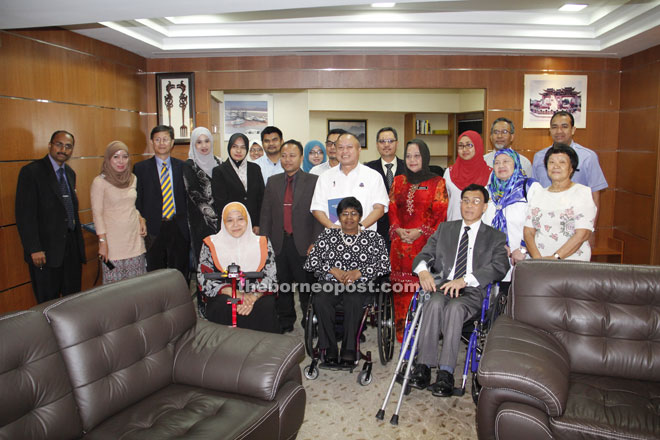
Chan (fifth right) in a group photo with the MKBOKU entourage led by Noormah (fourth right).
KUCHING: Making cities and towns inclusive, user-friendly and accessible is the key to integrate and empower people with disabilities in mainstream society.
This was said by Welfare Department deputy director-general of operation Noormah Abdul Rauf, who pointed out that an enabling environment especially in transportation, urban infrastructure and services is extremely crucial to allow people with disabilities access to society on equal basis with others.
“Accessibility to society means supporting and empowering people with all abilities to participate fully and equally in the society and development,” she said.
Noormah said this after leading an entourage from the National Council for People with Disabilities (MKBOKU) to pay a courtesy call on Kuching South City Council (MBKS) mayor Dato James Chan yesterday.
“Lack of disabled-friendly facilities and services are the greatest barrier to self-dependency, development and achievement as well as putting severe constraint for them to participate in employment, education, social activities and many other aspects of life,” she added.
A safe and reliable public transportation prepared and equipped to accommodate people with special needs, she emphasised, play a great role in ensuring enhanced mobility so that they can go to work, school and carry on with activities as part of the society.
Noormah said that inclusion matters to meet the objective of having at least one per cent of people with disabilities employed in the public and private sector.
“We are happy to share that 1.3 per cent of the workforce in the Women, Family and Community Development Ministry consist of people with disabilities,” she said.
Employment, she elaborated, indicates that people with disabilities can enhance their own capacities and live an independent life that would in turn reduce inequalities in society.
“However, more needs to be done to increase the employment rate of people with disabilities in the workforce. So, we hope that other ministries and the private sector can put in more effort to achieve this objective,” she said.
Earlier in the meeting, Chan gave briefs and inputs on the development of cities where the built-in environment is equipped with disabled-friendly facilities.
“We are happy to observe that there are OKU-friendly toilets as well as ramps and rails for mobility around the public places including the MBKS headquarters. This not only defines the city but shows that the municipal council is taking issues relating to people with special needs seriously,” Noormah said.
Chan proposed that MKBOKU organise a sensitisation session with corporations, non-governmental organisations
(NGOs), government agencies and departments as well as the construction sector especially architects in Sarawak.
“He hopes that through the session, we can raise greater awareness of the issues affecting people with special needs. With awareness, they can incorporate disabled-friendly solution in their building projects in respect of compliance with the building by-laws,” she said.
On another related issue, both Chan and Noormah urged parents to not be ashamed of their children with special needs but have the strength and be brave to face the world.
“According to statistics, there are 371,594 registered people with disabilities in Malaysia. Out of the number, 25,467 are
from Sarawak. But there could be more yet to be registered,” Noormah said.
“We are doing our advocacy and campaign. We want to encourage people with special needs to register in order to
take advantage of the benefits offered,” she added.
Among the 25 benefits are free international passport, 50 per cent discount on use of public transport, tax exemption, healthcare, discount for Malaysian Airline flights, financial assistance, education, housing and various trainings.
MKBOKU was established on August 2008 under Section 3 of the Persons with Disabilities Act 2008. It is chaired by Women, Family and Community Development Minister Datuk Seri Rohani Abdul Karim.
The committee comprises 20 representatives from the Ministry of Finance, Transport, Human Resource, Education and Health as well as individuals.
Among the functions of the council are to oversee the implementation of national policies and plans of action, make recommendations to the government on all aspects of the disabled, monitor and evaluate the impact of policies, programmes and activities designed to achieve full and effective participation of disabled persons and recommend changes to existing laws and propose new legislations to integrate people with disabilities into mainstream society.
Also present were Human Rights Commission of Malaysia (Suhakam) Sarawak commissioner Francis Johen Adam, Senator Bathmavathi Krishnan and academician Professor Dr Ruzita Mohd Amin.
